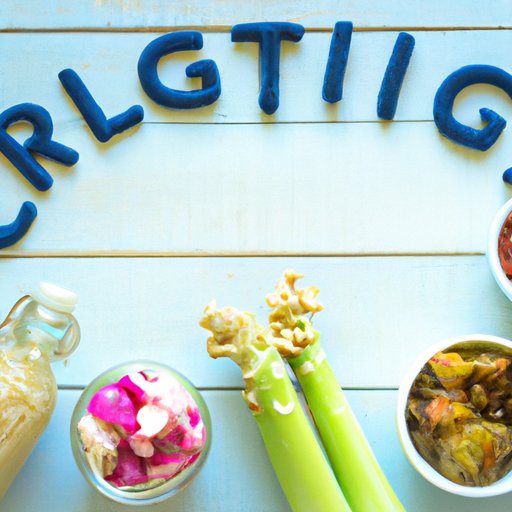Introduction
Gut health is an important part of overall health and wellbeing. It’s no surprise then that many people are looking for ways to improve their digestive systems by eating the right kinds of foods. But what foods are good for gut health? In this article, we’ll explore what foods can help maintain or improve your gut health and how you can create a balanced diet for optimal digestion.
Dietary Approaches to Gut Health
When it comes to improving your gut health, there are several dietary approaches that can be taken. One popular approach is the Mediterranean diet, which emphasizes consuming fruits, vegetables, whole grains, legumes, nuts, fish, and olive oil. According to a study published in Nutrients, following a Mediterranean diet has been linked to improved gut health. Another popular approach is the low-FODMAP diet, which eliminates certain types of carbohydrates known as FODMAPs that can cause digestive symptoms such as bloating and gas. A study published in Gastroenterology Research and Practice found that following a low-FODMAP diet can lead to improvements in gut health.
Probiotics and Their Role in Gut Health
Probiotics are live microorganisms that can benefit your gut health. They are often referred to as “good bacteria” and can help promote a healthy balance of bacteria in the gut. Probiotics can be found in some foods, such as yogurt, miso, sauerkraut, and kimchi, as well as in supplement form. According to a study published in the International Journal of Food Science and Nutrition, probiotics can help improve digestive health by increasing the number of beneficial bacteria in the gut.
When selecting a probiotic supplement, it’s important to choose one that contains multiple strains of beneficial bacteria. Additionally, look for a product that contains at least 10 billion CFUs (colony forming units) per serving. Finally, read the label carefully to make sure the product is free of allergens and other ingredients that may not be suitable for your needs.
Prebiotic-Rich Foods for Gut Health
In addition to probiotics, prebiotics are also important for maintaining gut health. Prebiotics are non-digestible fibers that act as food for beneficial bacteria in the gut. Examples of prebiotic-rich foods include garlic, onions, bananas, oats, apples, and Jerusalem artichokes. According to a study published in the British Journal of Nutrition, prebiotics can help improve gut health by providing fuel for beneficial bacteria in the gut.

Fermented Foods for Gut Health
Fermented foods are another type of food that can benefit gut health. Fermented foods are foods that have been through a process of fermentation, which involves allowing beneficial bacteria to break down the food. Examples of fermented foods include yogurt, kefir, sauerkraut, kimchi, and kombucha. A study published in the journal Nutrients found that consumption of fermented foods was associated with improved gut health.

Specific Nutrients for Maintaining Gut Health
Certain nutrients are also important for maintaining gut health. For example, fiber is essential for promoting regular bowel movements and preventing constipation. Additionally, omega-3 fatty acids can help reduce inflammation in the gut, while vitamin D can help strengthen the gut barrier. Magnesium and zinc can also be beneficial for gut health by supporting the growth of beneficial bacteria in the gut.
You can get these nutrients from food sources such as fruits, vegetables, whole grains, nuts, seeds, and fatty fish. Additionally, supplements can provide additional amounts of these nutrients if needed.

Creating a Balanced Diet for Optimal Gut Health
Creating a balanced diet is key for optimal gut health. Eating a variety of nutrient-rich foods, such as fruits, vegetables, whole grains, lean proteins, and healthy fats, will ensure that you are getting all of the essential vitamins and minerals your body needs. Additionally, it’s important to limit processed foods, refined sugars, and saturated fats, as these can interfere with gut health.
Finally, it’s important to stay hydrated by drinking plenty of water throughout the day. Water helps keep your digestive system functioning properly and can help reduce bloating and constipation.
Conclusion
Gut health is an important part of overall health and wellbeing. There are certain foods, nutrients, and dietary approaches that can help maintain or improve your gut health. Probiotics, prebiotics, and fermented foods can help support the growth of beneficial bacteria in the gut. Additionally, specific nutrients such as fiber, omega-3 fatty acids, vitamin D, magnesium, and zinc can also be beneficial for gut health. Creating a balanced diet that includes a variety of nutrient-rich foods can help ensure optimal gut health.
(Note: Is this article not meeting your expectations? Do you have knowledge or insights to share? Unlock new opportunities and expand your reach by joining our authors team. Click Registration to join us and share your expertise with our readers.)
